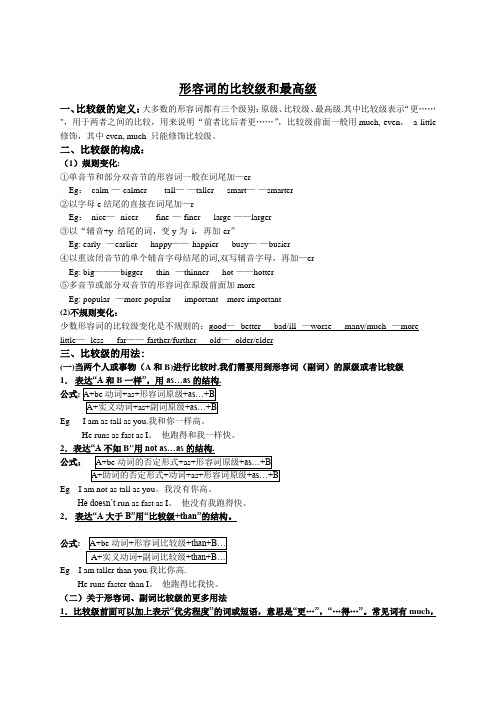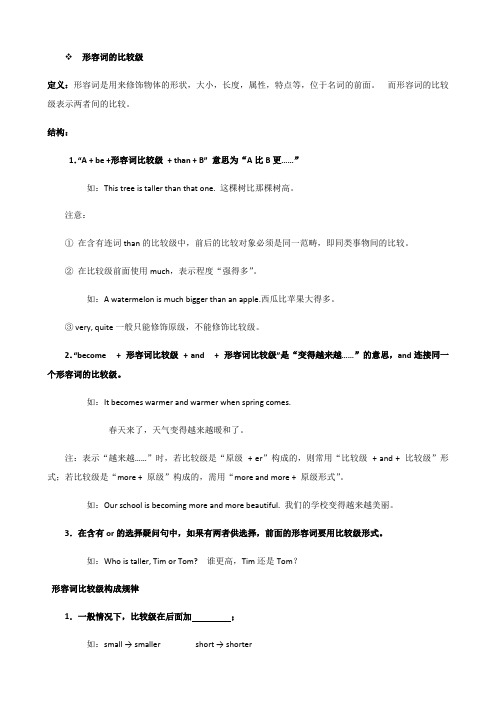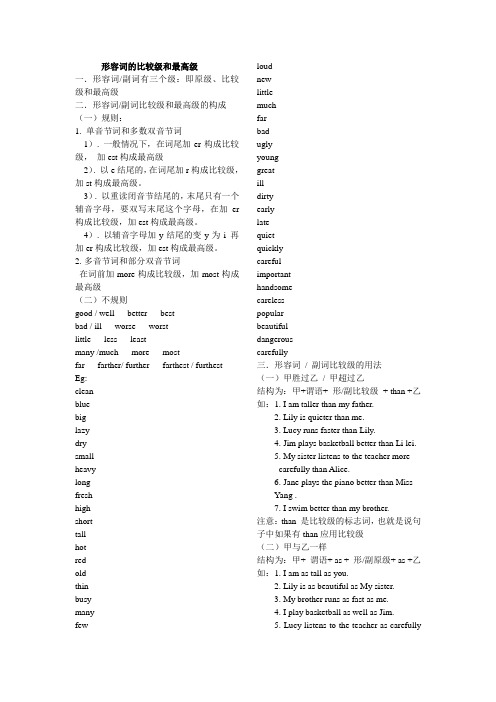(完整)小学形容词的比较级和最高级
(完整)比较级和最高级

(完整)比较级和最高级一、形容词的比较级和最高级变化规则;1、规则变化:(1) 单音节词和少数双音节词一般在词尾加er或est:如: small ---smaller --- the smallest(2) 以不发音的e字母结尾的加r,或st:如: late --- later --- the latest(3) 以辅音字母加y结尾的变y为I加er或est:如: easy --- easier --- the easiest(4)以一个辅音字母结尾的重读闭音节词双写最后一个辅音字母再加er或est:如: big --- bigger --- the biggest以er,ow结尾的双音节词加er 或est如: slow --- slower --- the slowest(5) 多音节词前加more或most, 副词最高级前省略the.如: important --- more important --- the most important2.不规则变化good / well --- better --- the best 好bad / badly / ill --- worse --- the worst 坏many / much --- more --- the most 多little --- less --- the least 少old --- older / elder --- the oldest / the oldest 老, 旧far --- farther / further --- the farthest / the furthest 远常见形容词比较级、最高级变化一览表1.在形容词词尾加上“er”“est”构成比较级、最高级:bright(明亮的)—brighter—brightest broad(广阔的)—broader—broadest cheap(便宜的)—cheaper—cheapest clean (干净的)—cleaner—cleanestclever(聪明的)—cleverer—cleverest cold(寒冷的)—colder—coldest cool(凉的)—cooler—coolest dark(黑暗的)—darker—darkest deep(深的)—deeper—deepest fast(迅速的)—faster—fastestfew(少的)—fewer—fewest great(伟大的)—greater—greatest hard(困难的,硬的)—harder—hardest high(高的)—higher—highest kind(善良的)—kinder—kindest light(轻的)—lighter—lightest long(长的)—longer—longest loud(响亮的)—louder—loudestlow(低的)—lower—lowest near(近的)—nearer—nearest new(新的)—newer—newest poor(穷的)—poorer—poorestquick(快的)—quicker—quickest quiet(安静的)—quieter—quietestrich(富裕的)—richer—richest short(短的)—shorter—shortestslow(慢的)—slower—slowest small(小的)—smaller—smallest smart(聪明的)—smarter—smartest soft(柔软的)—softer—softest strong(强壮的)—stronger—strongest sweet (甜的)—sweeter—sweetest tall(高的)-taller-tallest thick(厚的)—thicker—thickest warm(温暖的)—warmer—warmest weak(弱的)—weaker—weakest young(年轻的)—younger—youngest2.双写最后一个字母,再加上“er”“est”构成比较级、最高级:big(大的)—bigger—biggest fat(胖的)—fatter—fattesthot(热的)—hotter—hottest red(红的)—redder—reddestsad(伤心的)—sadder—saddest thin(瘦的)—thinner—thinnestwet(湿的)—wetter—wettest mad(疯的)—madder—maddest3.以不发音的字母e结尾的形容词,加上“r”“st”构成比较级、最高级:able(能干的)—abler—ablest brave(勇敢的)—braver—bravest close(接近的)—closer—closest fine(好的,完美的)—finer—finest large(巨大的)—larger—largest late(迟的)—later—latestnice(好的)—nicer—nicest ripe(成熟的)—riper—ripestrude(粗鲁的)—ruder—rudest safe(安全的)—safer—safest strange(奇怪的)—stranger—strangest wide(宽广的)—wider—widest wise(睿智的,聪明的)—wiser—wisest white(白的)—whiter—whitest4.以字母y结尾的形容词,把y改为i,再加上“er”“est”构成比较级、最高级:busy(忙碌的)—busier—busiest dirty(脏的)—dirtier—dirtiest dry(干燥的)—drier—driest early(早的)—earlier—earliest easy(容易的)—easier—easiest friendly(友好的)—friendlier—friendliest funny(好玩的)—funnier—funniest happy(开心的)—happier—happiest healthy(健康的)—healthier—healthiest heavy(重的)—heavier—heaviest hungry(饿的)—hungrier—hungriest lazy(懒惰的)—lazier—laziestlucky(幸运的)—luckier—luckiest naughty(调皮的)—naughtier—naughtiest noisy(嘈杂的)—noisier—noisiest pretty (美丽的)—prettier—prettiest silly(傻的)—sillier—silliest spicy(辣的)—spicier—spiciestthirsty(渴的)—thirstier—thirstiest ugly(丑的)—uglier—ugliest4.双音节、多音节形容词,在单词前面加上“more”“most”构成比较级、最高级:afraid(害怕的)—more afraid—most afraidbeautiful(美丽的)—more beautiful—most beautifulcareful(仔细的)—more careful—most carefulcheerful(开心的)—more cheerful—most cheerfulcrowded(拥挤的)—more crowded—most crowdeddangerous(危险的)—more dangerous—most dangerous delicious(美味的)—more delicious—most deliciousdifficult(困难的)—more difficult—most difficultexciting(令人兴奋的)—more exciting—most excitingexpensive(昂贵的)—more expensive—most expensivefamous(著名的)—more famous—most famousfrightened(受惊的)—more frightened—most frightened frightening(令人害怕的)—more frightening—most frighteninghard-working(勤奋的)—more hard-working—most hard-workinghelpful(有帮助的)—more helpful—most helpfulhonest(诚实的)—more honest—most honestimportant(重要的)—more important—most importantinteresting(有趣的)—more interesting—most interesting polite(有礼貌的)—more polite—most politeterrible(可怕的)—more terrible—most terribletired(累的)—more tired—most tired5.不规则变化的形容词:bad(坏的)—worse—worst good(好的)—better—bestfar(远的)—farther—farthest (far—further—furthest)ill(病的)—worse—worst little(少的)—less—leastmany(多的)—more—most much(多的)—more—most old(年老的)—older—oldest ( old—elder—eldest)well(好的,身体好的)—better—best一. 写出下列形容词或副词的比较级和最高级.bad ________________ ______________________________clean ________________ ______________________________ famous ______________ _______________________dirty _________________ ______________________________big __________________ _____________________________small _________________ ______________________________heavy _____________ ______________________little __________________ ______________________________hard __________________ ______________________________ happy _________________ ______________________________far ___________________ ______________________________ expensive _____________________ ________________________________ well _________________ ______________________________easy __________________ ______________________________ wide ___________________ _______________________________ young _________________ ________________________________ rude ___________________ ________________________________ cheap ___________________ _______________________________ ugly __________________ _________________________________ busy ___________________ ________________________________ old ____________________ _________________________________ noisy __________________ _________________________________ interesting _____________________ _______________________________ hot ____________________ _________________________________ cold ___________________ _________________________________ many __________________ ________________________________ bright __________________ _______________________________ boring __________________ _______________________________ difficult _______________________ ________________________________ beautiful _______________________ _____________________________thin _____________________ _______________________________ good ____________________ _______________________________ strong____________________ ______________________________ high _________________ _______________________warm ________________ _______________________late __________________ _______________________weak _________________ ______________________tall ___________________ ______________________short __________________ ______________________loud ___________________ ______________________lazy ___________________ ______________________quick __________________ ______________________angry __________________ ______________________clever __________________ ______________________smart __________________ ______________________low ____________________ __________________二、选择填空1. Which does Jimmy like _____ , Chinese or Art?A. wellB. bestC. betterD. much2. The Changjiang River is one of _____ in the world.A. the longest riverB. longest riversC. the longest riversD. longer rivers3. _____ of the two women is Mrs Brown.A. The beautifulB. The more beautifulC. More beautifulD. The most beautiful4. My mooncake is nicer _____ his.A. likeB. withC. forD. than5. You are fatter than _____ .A. heB. hisC. himD. he is tall6. He jumps _____ of the three.A. farB. furtherC. farthestD. furthest7. My hair is longer than _____ .A. my sisterB. KateC. my brother’sD. Lucys’8. There are _____ paper here .Please bring some.A. littleB. lessC. fewerD. a little9. The pen is _____ than that one.A. more cheapB. cheapC. much cheaperD. quite cheaper10.Tom speaks Chinese _____ better than Jimmy.A. moreB. veryC. a lot ofD. much11.There are _____ girls in Class Two than in Class Four.A. moreB. nicestC. mostD. best12.It’s too _____ for you to do that.A. easyB. more dangerousC. harderD. the easiest13.Who has _____ apples now, Jim, Lily or Lucy?A. muchB. biggestC. betterD. the most14.You have more rulers than me. But _____ are nicer than _____ .A. mine, yoursB. mine, yourC. my, yoursD. my, your15.Tingting is _____ than Meimei, but Meimei is _____ than Tingting.A. all, strongerB. taller, strongestC. tallest, strongD. taller, stronger16.Mother is _____ in my family.A. busyB. busierC. the busiestD. more busy17.There are _____ in the park on Sunday.A. more childrenB. a lot of peopleC. much men and womenD. many peoples18.-This blue sweater is too big for me .-Will you please show me a _____ one?A. smallB. smallerC. the smallestD. smallest19.No one is _____ Mary in the class.A. so tallest asB. as taller asC. so high asD. so tall as20. This bike is _____ than that one.A. twenty yuan dearB. twenty yuan dearerC. dear twenty yuanD. dearer twenty yuan[参考答案] CCDDA CDBCD AADAD CBBDB三、用所给词的适当形式填空1.Your classroom is _____ (wide) and _____ (bright) than ours.2.There are _____ (few) hours of sunlight a day in winter than in summer.3.Which do you like _____ (well) , maths or chemistry?4.This is the _____ (good) film I have ever seen.5.Africa is the second _____ (large) continent.6.What he said made his mother much _____ (angry) .7.I’m not as _____ (careful) as he.8.We’ve got as _____ (many) books as we need.9.Pratice as _____ (much) as you can.10.They have done _____ (much) work with _____ (little) money.11.You’re the _____ (kind) person I’ve ever met.12.He is _____ (young) than his two sisters.13.The _____ (old) I get, the _____ (strong) I seem to feel.14.The weather is getting _____ (warm) and _____ (warm) .15.Summer is _____ (hot) season of the year.[参考答案] 1. wider, brighter 2. fewer 3. better 4. best 5. largest 6. angry 7. careful 8. many 9. much 10. more, less 11. kindest 12. younger 13. older, stronger, 14. warmer, warmer 15. the hottest。
形容词的比较级与最高级详细讲解

形容词的比较级和最高级一、比较级的定义:大多数的形容词都有三个级别:原级、比较级、最高级.其中比较级表示“更……",用于两者之间的比较,用来说明“前者比后者更……”,比较级前面一般用much, even,a little 修饰,其中even, much 只能修饰比较级。
二、比较级的构成:(1)规则变化:①单音节和部分双音节的形容词一般在词尾加—erEg:calm-—-calmer tall—-—taller smart—-—smarter②以字母e结尾的直接在词尾加—rEg:nice—--nicer fine-—-finer large-——larger③以“辅音+y 结尾的词,变y为i,再加-er”Eg: early--—earlier happy——-happier busy—-—busier④以重读闭音节的单个辅音字母结尾的词,双写辅音字母,再加—erEg: big———bigger thin--—thinner hot-——hotter⑤多音节或部分双音节的形容词在原级前面加moreEg: popular--—more popular important---more important(2)不规则变化:少数形容词的比较级变化是不规则的:good—--better bad/ill--—worse many/much--—more little—--less far——-farther/further old—--older/elder三、比较级的用法:(一)当两个人或事物(A和B)进行比较时,我们需要用到形容词(副词)的原级或者比较级1.表达“A和B一样”,用as…as的结构.公式Eg I am as tall as you.我和你一样高。
He runs as fast as I。
他跑得和我一样快。
Eg I am not as tall as you。
我没有你高。
He doesn’t run as fast as I。
(完整版)小学英语形容词的比较级

形容词的比较级定义:形容词是用来修饰物体的形状,大小,长度,属性,特点等,位于名词的前面。
而形容词的比较级表示两者间的比较。
结构:1.“A + be +形容词比较级+ than + B” 意思为“A比B更……”如:This tree is taller than that one. 这棵树比那棵树高。
注意:①在含有连词than的比较级中,前后的比较对象必须是同一范畴,即同类事物间的比较。
②在比较级前面使用much,表示程度“强得多”。
如:A watermelon is much bigger than an apple.西瓜比苹果大得多。
③ very, quite一般只能修饰原级,不能修饰比较级。
2.“become + 形容词比较级+ and + 形容词比较级”是“变得越来越……”的意思,and连接同一个形容词的比较级。
如:It becomes warmer and warmer when spring comes.春天来了,天气变得越来越暖和了。
注:表示“越来越……”时,若比较级是“原级+ er”构成的,则常用“比较级+ and + 比较级”形式;若比较级是“more + 原级”构成的,需用“more and more + 原级形式”。
如:Our school is becoming more and more beautiful. 我们的学校变得越来越美丽。
3.在含有or的选择疑问句中,如果有两者供选择,前面的形容词要用比较级形式。
如:Who is taller, Tim or Tom? 谁更高,Tim还是Tom?形容词比较级构成规律1.一般情况下,比较级在后面加;如:small → smaller short → shorter2.在重读闭音节(即:辅音+元音+辅音)中,先双写末尾的辅音字母,比较级加-er,如:big →bigger hot →hotter3.以不发音e结尾的单音节词,比较在原级后加;如:large →larger nice →nicer4.以“辅音字母+y”结尾的双音节词,,比较级加;如:easy →easier heavy →heavier5.多数多音节词,比较级在前面加;如:beautiful → more beautiful different → more different6.有少数形容词的比较级是不规则的,必须熟记。
形容词的比较级和最高级

形容词的比较级和最高级一.形容词/副词有三个级:即原级、比较级和最高级二.形容词/副词比较级和最高级的构成(一)规则:1. 单音节词和多数双音节词1). 一般情况下,在词尾加er构成比较级,加est构成最高级2). 以e结尾的,在词尾加r构成比较级,加st构成最高级。
3). 以重读闭音节结尾的,末尾只有一个辅音字母,要双写末尾这个字母,在加er 构成比较级,加est构成最高级。
4). 以辅音字母加y结尾的变y为i 再加er构成比较级,加est构成最高级。
2.多音节词和部分双音节词在词前加more构成比较级,加most构成最高级(二)不规则good / well --- better --- bestbad / ill --- worse --- worstlittle --- less --- leastmany /much --- more --- mostfar --- farther/ further --- farthest / furthest Eg:clean _______ _______blue _______ ________big _______ ________lazy _______ ________dry _______ ________small _______ ________heavy _______ _______long ______ ________fresh _______ _______high _______ ________short ______ ________tall _______ ________hot _______ ________red _______ ________old _______ ________thin _______ ________busy _______ ________many _______ ________few _______ _________ loud _______ ________new ________ _______little ______ ________much _______ ________far _______ _________bad ______ ________ugly ______ ________young ______ _______great ______ ________ill ______ ________dirty _______ _______early ______ _______late ______ _______quiet _______ ________quickly _______ _______careful _______ ________important ________ _________handsome ________ _________careless __________ __________popular ___________ ___________ beautiful __________ ___________ dangerous _________ ___________ carefully _________ _________三.形容词/ 副词比较级的用法(一)甲胜过乙/ 甲超过乙结构为:甲+谓语+ 形/副比较级+ than +乙如:1. I am taller than my father.2. Lily is quieter than me.3. Lucy runs faster than Lily.4. Jim plays basketball better than Li lei.5. My sister listens to the teacher morecarefully than Alice.6.Jane plays the piano better than MissYang .7.I swim better than my brother.注意:than 是比较级的标志词,也就是说句子中如果有than应用比较级(二)甲与乙一样结构为:甲+ 谓语+ as + 形/副原级+ as +乙如:1. I am as tall as you.2. Lily is as beautiful as My sister.3. My brother runs as fast as me.4. I play basketball as well as Jim.5. Lucy listens to the teacher as carefullyas Lily.6. Jim plays the guitar as well as my brother.7. Lily sings as well as Linda.注意:as ... as 的中间应用形容词/副词原级(三)甲不如乙结构为:甲+谓语(否定)+ so/ as +形/副原级+as +乙= 甲+谓语+ less +形/副原级+than + 乙如:1. I am not so/ as tall as Jim.2. This classroom isn’t so / as bright asthat one.3.Lily doesn’t listen to the teacher so /as carefully as Lucy.4.My sister doesn’t play the guitar so /as well as me.5.Jane isn’t so / as beautiful as her sister.6.The weather in Beijing isn’t so/ ascold as that in Chongqing in winter.7.I don’t run so / as fast as Jane.注意:so / as .....as 的中间应用原级(四)比较级+and+比较级:越来越.....加er的:加er的比较级+ and + 加er的比较级如:smaller and smaller 越来越小faster and faster 越来越快stronger and stronger 越来越强壮lazier and lazier 越来越懒taller and taller 越来越高加more的:more and more +原级more and more beautiful 越来越漂亮more and more careful 越来越认真more and more important 越来越重要more and more popular 越来越受欢迎more and more careless 越来越粗心如:1. Our country is becoming stronger and Stronger.2. Because of the Internet, the world isgetting smaller and smaller.3.Our city will be more and morebeautiful in the future.(五)the +比较级;the +比较级:越....就越....如:1. The harder you study, the better grade you will get.2.The carefully you do your homework, the fewer mistakes yo will make.3.The earlier, the better.(六)两者中较.....的一个(在句子中如果有of the two;of the twins;of the two boys 或of the two girls等时,应用the + 比较级)如:1.Lily is the taller of the two girls.莉莉是两个女孩子中较高的一个2.Jane is the more beautiful of the two twins. 简是这对双胞胎中较漂亮的一个3.Jim is the more handsome of the two boys. 吉姆是这两个那男孩中较帅的一个(七)在比较级中,如果比较对象相同,用that来代替前面的单数名词或不可数名词,用those来代替前面所提到过的复数名词如:1.The weather in Beijing is colder than ______ in Chongqing in winter.2.The apples in the basket are redder than ______ on the tree.3.The book on the desk is more interesting than ______ in the schoolbag.(八)形容词/副词的比较级前可以用much / a little / a lot / even 等表程度的修饰词来修饰。
(完整版)形容词的比较级和最高级变化规则

(完整版)形容词的比较级和最高级变化规则1. 形容词比较级的变化规则形容词的比较级用于表示两个人或物之间的比较,通常通过在形容词后面加上"-er"来构成。
1. 单音节形容词:大部分单音节形容词直接在词尾加上"-er"。
- 例如:big(大)→ bigger(更大);fast(快)→ faster(更快)。
2. 以字母"e"结尾的形容词:直接在词尾加上"-r"。
- 例如:large(大)→ larger(更大);nice(好)→ nicer(更好)。
3. 以一个辅音字母结尾的形容词:双写最后一个辅音字母,再加上"-er"。
- 例如:hot(热)→ hotter(更热);big(大)→ bigger(更大)。
4. 以"y"结尾的形容词:将"y"变为"i",再加上"-er"。
- 例如:happy(快乐)→ happier(更快乐);pretty(漂亮)→ prettier(更漂亮)。
2. 形容词最高级的变化规则形容词的最高级用于表示三个或三个以上的人或物中的某一最高水平,通常通过在形容词前面加上"the"和在形容词后面加上"-est"来构成。
1. 单音节形容词:大部分单音节形容词在词尾加上"-est"。
- 例如:big(大)→ the biggest(最大);fast(快)→ the fastest(最快)。
2. 以字母"e"结尾的形容词:在词尾加上"-st"。
- 例如:large(大)→ the largest(最大);nice(好)→ the nicest(最好)。
3. 以一个辅音字母结尾的形容词:双写最后一个辅音字母,再加上"-est"。
(完整版)小学英语比较级

一、形容词、副词的比较级和最高级的构成规则1.大多数单词的变法small→smaller→smallest short→shorter→shortest great→greater→greatest clever→clevere r→cleverest narrow→narrower→narrowest tall→taller→tallest2.以不发音e结尾的单音节词,比较在原级后加-r,最高级在原级后加-st;large→larger→largest nice→nicer→nicest3.先双写末尾的辅音字母,比较级加-er,最高级加-est;big→bigger→biggest hot→hotter→hottest fat→fatter→fattest thin-thinner-thinnest sad-sadder--sa ddest 4.以“辅音字母+y”结尾的双音节词,把y改为i,比较级加-er,最高级加-est;easy→easier→easiest heavy→heavier→heaviest busy→busier→busiesthappy→happier→happiest5.其他双音节词和多音节词,比较级在前面加more,最高级在前面加most;beautiful→more beautiful→most beautifuldifferent→more different→most different注意:(1)形容词最高级前通常必须用定冠词 the,副词最高级前可不用。
6.有少数形容词、副词的比较级和最高级是不规则的,必须熟记。
good-----better------best好的well------better------best身体好的bad------worse------worst坏的ill--------worse-------worst病的many--------more------most许多 much------more--------most许多few------less-------least少数几个little-------less------least少数一点far------further------furthest更进一步,程度far------farther------farthest更远,路程old-------older------oldest年老的(指年纪)old------elder-------eldest年老的(指兄弟姐妹的排行)二、形容词、副词的比较级和最高级的用法1.“A + be +形容词比较级 + than + B”意思为“A比B更……”。
形容词的比较级和最高级

形容词的比较级和最高级形容词是描述性词语,用于修饰名词或代词,用来表达人、事物或概念的特征和属性。
当我们想要对事物进行比较时,比较级和最高级就派上了用场。
比较级用来比较两个人或物之间的差异,表示“更……”、“比……更……”之意。
形容词的比较级有规律和不规律两种形式。
规律比较级的构成:在形容词后加上“er”。
如:1. 高(tall)- 比较高(taller)2. 富有(rich)- 更富有(richer)3. 长(long)- 更长(longer)当形容词以“e”结尾时,只需在其后加上“r”。
例如:1. 大(large)- 更大(larger)2. 短(short)- 更短(shorter)如果形容词以“辅音字母+元音字母+辅音字母”结尾,且重读最后一个音节时,需双写末尾的辅音字母,并加上“er”。
如:1. 重(heavy)- 更重(heavier)2. 热(hot)- 更热(hotter)不规律比较级则需要变化形态,例如:1. 好(good)- 更好(better)2. 多(many)- 更多(more)3. 少(few、little)- 更少(fewer、less)另外,当比较级前面有“than”时,表示与之前的人或物相比更……。
例如:1. 我比我弟弟更高。
I am taller than my younger brother.2. 这只猫比那只狗更可爱。
This cat is cuter than that dog.最高级用来表示同一类人或事物中最高的一项,表示“最……”或“最高的”。
构成最高级形容词,需要在形容词前加上“the”并在后面加上“est”。
如:1. 高(tall)- 最高的(the tallest)2. 富有(rich)- 最富有的(the richest)3. 长(long)- 最长的(the longest)当形容词以“e”结尾时,只需在其前加上“th”。
例如:1. 大(large)- 最大的(the largest)2. 短(short)- 最短的(the shortest)如果形容词以“辅音字母+元音字母+辅音字母”结尾,且重读最后一个音节时,需双写末尾的辅音字母,并加上“est”。
(完整word)小学英语比较级和最高级变化规则

小学英语比较级和最高级变化规则一、规则变化1. 单音节以及少数双音节形容词或副词大致按以下规律变化:(1) 一般在形容词或副词后面直接加–er 变为比较级,加–est 变为最高级。
如:old—older—oldest high—higher—highest(2) 以重读闭音节结尾,且末尾只有一个辅音字母的,则双写最后一个辅音字母,再加-er变为比较级,加–est 变为最高级。
如:big—bigger—biggest thin—thinner—thinnest(3) 以“辅音字母+y”结尾的单词,则将改y为 i 再加-er变为比较级,加–est 变为最高级。
如:busy—busier—busiest heavy—heavier—heaviest(4) 以字母 e 结尾的单词,直接加–r 变为比较级,加–st 变为最高级。
如:large—larger—largest free—freer—freest2. 多音节以及某些双音节形容词或副词变为比较级或最高级时,则通常在其前加more变为比较级,加most变为最高级。
如:important—more important—most importantdifficult—more difficult—most difficultuseful—more useful—most useful3. 少数单音节单词,特别是分词形容词,须在前面加more变为比较级,(the) most变为最高级。
如:fond—more fond—most fondpleased—more pleased—most pleased4. 有些单词的比较级或最高级有两种形式,如:clever—cleverer / more clever—cleverest / most cleverable—abler / more able—ablest / most ablenarrow—narrower / more narrow—narrowest / most narrow二、不规则变化原级比较级最高级good better bestmany more mostmuch more mostbad worse worstlittle less leastwell better bestbadly worse worstill worse worstfar farther farthestfurther furthest。
- 1、下载文档前请自行甄别文档内容的完整性,平台不提供额外的编辑、内容补充、找答案等附加服务。
- 2、"仅部分预览"的文档,不可在线预览部分如存在完整性等问题,可反馈申请退款(可完整预览的文档不适用该条件!)。
- 3、如文档侵犯您的权益,请联系客服反馈,我们会尽快为您处理(人工客服工作时间:9:00-18:30)。
形容词的比较级和最高级一.形容词的比较级和最高级的用法在英语中,在表示两者作比较时,形容词要用特别的形式,称为“比较级”,三者及三者以上作比较时用“最高级”,原来的形容词称为“原级”。
e.g. You look taller than me .你比我高。
You are heavier than me.你比我重。
I am the strongest in my class. 我是我们班最强壮的。
二.形容词比较级和最高级句型结构1.比较级句型:主语A+ be 动词 + 形容词比较级 + than + B A……比B……e.g. He is older than me.他比我年长。
【拓展】比较级的其他表达方式①"the+形容词比较级+of the two+……"表示"...是两者中较…的"。
e.g. He is the heavier of the two boys.Look at the two boys. My brother is the taller of the two.②"比较级+and+比较级"表示"越来越……"。
e.g. He is getting taller and taller.他越来越高。
③"the+比较级,the+比较级"表示"越……越……"。
e.g. The more careful you are,the fewer mistakes you'll make你越细心,就会越少犯错误。
he more we get together, the happier we will be.我们聚得越多,我们就越开心The harder you work , the better you'll be.你越努力工作,你就会变得越好。
辅助练习:1. Jim is _______ than all the others. (tall)2. Things are getting _______ and _______. (bad)3. The higher you climb, the _______ it will be. (cold)2.最高级句型:主语 + be动词 + the + 形容词最高级 + 介词短语(介词短语:in my class ,in the room ,in the hall …)e.g. He is the tallest in our class.【拓展】最高级的其他形式①"主语+be+ one of the+形容词最高级+复数名词+in/of短语"表示"……是……中最……之一"e.g. Beijing is one of the largest cities in China.②序数词+最高级e.g. Hainan Island is the second largest island in China.辅助练习:1.The changjiang river is ____________________ (long) river in China.2. The Yellow River (Huang He) is ________________ (第二长)river in China3.A.形容词的比较级和最高级变化规则B. 部分双音节与多音节的词比较级在原级之前加more, 最高级在原级之前加most beautiful---more beautiful---most beautifulinteresting--- more interesting –most interestingdifficult--- more difficult – most difficultC.不规则变化的形容词:little / few - less – least good – better - bestbad/ill - worse – worst far -- farther/further—farthest/furthestmany/much – more – moste.g. 比较一下下列句子,领悟原级、比较级、最高级的用法。
Tom is tall.他很高。
Tom is as tall as John.汤姆和吉姆一样高。
Bob is taller than John.鲍勃比约翰高。
John is the tallest of the three.约翰是三个当中最高的一个。
John is the tallest in his class.约翰在他们班最高。
【课外拓展】1.在比较等级中常用much, a lot, far, even等常修饰比较级,表程度。
e.g.姚明比我高多了。
Yao Ming is very taller than I. (误)Yao Ming is much taller than I.(正)2.在比较等级的句型中,比较的双方必须是同类事物,否则会引起歧义。
即人与人,物与物的比较。
e.g. 他的尺子比我的长。
His ruler is longer than me.(误)His ruler is longer than mine.(正)3.形容词最高级前一般有定冠词,但如果前边也有物主代词,名词所有格等词来修饰时,定冠词the常被省略。
e.g.加里是我最好的朋友。
Gary is my the best friend. (误)Gary is my best friend. (正)4. 形容词比较级前一般不加定冠词,但句中有“of the two”结构表示“两者中较…的一个”时,定冠词the要加上。
e.g.苏珊是这两个女孩子当中较胖的一个。
Susan is fatter of the two girls. (误)Susan is the fatter of the two girls. (正)同步练习:一、选择题。
1. She is ________ than ________ .A. busier / usB. busier / weC. more busy / usD. more busy / we2. Jane is ________ than Betty.A. less tallerB. less tallestC. less tallD. not as tall3. China is ________ country in the world.A. the third largestB. the largest thirdC. the third largeD. a third largest4. -Which is ____ season in Beijing? -I think it's autumn.A. goodB. betterC.best D. the best5.- Which is__________ , the sun, the moon or the earth?-- Of course, the moon is.A. smallB. smallerC. smallestD. the smallest6.The air in Beijing is getting much _____ now than a few years ago.A. cleanB. cleanerC. cleanestD. the cleanest7. Mobile phones are very popular now and they are _____ than before.A. cheapB. cheaperC. cheapestD. the cheapes8.I study English as_______ as my brother.A. hardB. harderC. hardestD. the hardest9. Which is _____ , a bicycle or a computer?A. expensiveB. more expensiveC. the most expensiveD.expensiver10. The Yellow River is one of ______rivers in China.A. longB. longerC. the longestD. longest二、写出下列单词的比较级和最高级。
1. nice _________________________2. fat ______________________________3. slow _________________________4. dry _________________________________5. happy ________________________6. wet _________________________________7. much __________________________ 8. ill ________________________________9. little __________________________ 10. bad _____________________________三. 根据句意,用所括号内所级形容词的正确形式填空。
1. Mr. Smith is ____________ man in this office. (rich)2. Winter is _____________ season of the years. (cold)4. It is much _________ today than yesterday. (hot)5. She is a little ________ than her classmates. (careful)6. Bob is _________ ( young ) than Fred. but _________ (tall) than Fred.7. Almost all the students' faces are the same ,but Li Deming looks _______ (fat) than before after the summer holidays.8.Which is _________ (heavy), a duck or a chicken?9. An orange ia a little ______ (big) than an apple, but much ________ (sm all) than a watermelon.10.-- How _________ (tall) is Sally?--She' s 1.55 metres ________ (tall). What about Xiaoling?-- She' s only 1.40 metres ________ (tal)l) She is much _______ (short) than Sally.2) She is also the _______ (short) girl in the class.四、课堂总结:和学生一起,对本次课的主要内容作总结概括,并用红笔留痕。
